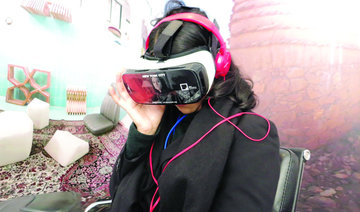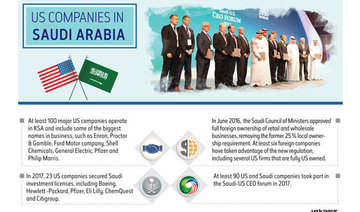NEW YORK: The compelling story of how Saudi Arabia is changing is the theme of an exhibition of contemporary Saudi art, which opened on Monday in New York at the newly established Misk Art Institute.
The four-day exhibition marks the official visit to the US of Crown Prince Mohammed bin Salman and showcases works by some of the most admired artists in the Kingdom, with 27 major artworks. The art institute is part of the Misk Foundation, the non-profit body the crown prince set up to promote and encourage creativity among the Kingdom’s youth.
DANA AWARTANI
Born in Jeddah in 1987, Awartani has a degree in fine art from the prestigious Central St. Martin’s College in London and a master’s degree in traditional arts from the Princes School in London.
She specializes in illumination, tile work and parquetry and her work typically features geometric patterns. She has exhibited her work in Salt Lake City, San Francisco and the Venice Biennale. Several of her works are included in the Farjam Collection, one of the world’s largest collections of Islamic art.
RASHED AL-SHASHAI
One of the most active figures on the Saudi contemporary art scene, Al-Shashai, 40, was born in Al-Baha and raised in Makkah. He is a founder member of the Saudi Arabia Fine Arts Society, the Art Education Society and founder-director of Tasami Centre for Visual Art, which supports cutting-edge art in the Kingdom. He has exhibited widely both in the Gulf region, in North Africa and the US and is considered an important influence on the new generation of Saudi artists. He also lectures and organizes exhibitions and forums.
AHMAD ANGAWI
He studied industrial design at the Pratt Institute in Brooklyn, New York and then did a master’s degree in traditional art at the Prince’s School in London. He says his work is inspired by Islamic principles and firmly believes that industrial designers are the craftsmen of today. Angawi is a cofounder of Al-Hangar, an independent artist initiative, which organizes cultural exchanges through exhibitions and educational programs. He has exhibited throughout the Gulf as well as Venice and the US.
AJLAN GHAREM
Born in 1985 in the southern city of Khamis Mushait, Gharem is now based in Riyadh, where he teaches mathematics and applies mathematical discipline to making his art. He founded the Gharem Studio with his artist brother, Abdulnasser Gharem. He has been exhibited in the US and London and in 2011 was chosen to work with artists and curators at the British Museum, Tate Modern and Penguin Books.
SAEED SALEM
Born in 1984 in Jeddah, Salem is of Yemeni descent and was educated in Malaysia. He graduated from Curtin University, Perth, Australia in 2007 with a degree in advertising, which included a photography module. He had no intention of becoming a photographer but after working in several design and photography studios, he set up his own shop, 181 degrees, in 2009.
His first major stint in the contemporary art world was through Edge of Arabia’s We Need to Talk exhibition in Jeddah in 2012, where Salem began project Neonland, a series of iconic photographs capturing the essence of Jeddah.
FATIMAH HASSAN
The women of Asir, southwest Saudi Arabia are famous for the colorful murals and frescoes they paint to decorate their homes. Hassan, herself an Asiri, is a proud exponent and promoter of the traditional art form, having showcased examples at the UN in New York, among other places. With her son Ahmed, daughter Jamila and the Saudi Commission for Tourism and National Heritage, she has lobbied to have traditional murals in Asir placed on the UNESCO World Heritage list.
The Al-Qatt Al-Asiri murals by women artists from southern Saudi Arabia have been specially commissioned for the Misk Art Institute exhibition.
AMR ALNAGMAH
The conceptual artist has created pieces featuring the Ka’aba. His piece, “Digital Spirituality” has the black cube located in the center of a circuit board. He has exhibited his work at the Arab-American National Museum in Dearborn, Michigan, the only national institution in the US dedicated to the Arab-American experience.
















